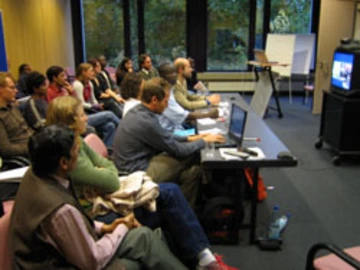ZEF’s International Doctoral Studies Program is being renamed
February 26, 2007.
ZEF’s International Doctoral Studies Program is being renamed into „Bonn International Graduate School for Development Research” (BIGS-DR).
Here are the latest “Facts & Figures” on the Program:
The BIGS-DR is a unique graduate program in Germany and Europe due to its scope and transdisciplinary set-up. The program’s concept is based on a practical, problem-solving scientific approach. The BIGS-DR combines the knowhow and capacities of the following three faculties of Bonn University: Philosophy, Agriculture, as well as Mathematics and Natural Sciences.
Since its inception in 1999, 323 students from 67 countries participated in the BIGS-DR, 165 of them have finished the program with a doctoral degree. Eighty percent of these graduates received their degree from the University of Bonn, the remaining participants received degrees from other universities in Germany and abroad. Currently, 130 students are enrolled in the BIGS-DR. Every year, around 300 students from all over the world apply for the 35 positions available annually. In 2006, 47% of the applications came from Africa, 34% from Asia, 4% from Europe (mainly from Germany), 4% from Central Asia and the countries of CIS, 6% from Latin America, and 4% from Arab countries.
The BIGS-DR course program is made up of intensive, tailor-made block courses, providing students with interdisciplinary skills as well as disciplinary knowledge and tools. Their own research must have a development focus and fit into ZEF’s development research agenda. In 2006, ZEF offered the doctoral students more than 750 hours of classes, courses, seminars, and workshops. In the first six months of the program the doctoral students take part in three course modules: 1) an interdisciplinary course, during which the students widen their theoretical horizon; 2) disciplinary courses in the areas of Development Sociology & Politics, Development Economics & Politics, and Natural Resource Management & Ecology, during which the students deepen the development related aspects of their research areas; and 3) a series of lectures about current topics and methods of development research, combined with courses on research methodology, remote sensing, geographical information systems (GIS), and mathematics and statistics. In addition, a gender workshop and an intercultural seminar are being offered. The final goal of this program is to provide the doctoral students with so-called “T-shaped skills”. The vertical line of the T symbolizes the ability to analyze and solve a problem with a profound scientific understanding, whereas the horizontal line of the T stands for the ability to think in interdisciplinary and transdisciplinary terms and to analyze problems in a complex development setting.
After the course program the students conduct around one year of field research in a developing country. During this period, each student is being visited by his or her supervisor at least once. During the third year of the program the doctoral students are at ZEF to write and finish their doctoral theses.
In 2006 ZEF’s doctoral students published 125 scientific papers - most of them in peer- reviewed scientific journals - and participated in a large number of conferences.
The high standard of the doctoral students’ work is shown by the assessment of their doctoral theses: many graduates receive a degree with the distinction of “magna cum laude” or some even with “summa cum laude”.
Since 2005 ZEF has been setting up an alumni network. In 2006 the network consisted of 165 ZEF-Alumni from 43 countries. 53% of these alumni are coming from developing countries, 20% from transition economies and 27% from industrial states. The alumni network has several benefits: It makes long-term cooperations and contacts with governmental and non-governmental development organizations possible, but also provides opportunities to recruit new doctoral students. At the moment about 20% of the applications for the BIGS DR result from recommendations made by ZEF alumni. The ZEF alumni are registered and presented in a database of development experts accessible via the ZEF homepage www.zef.de. This database offers a service to institutions worldwide for recruiting experts and consultants in the field of development research.
ZEF and BIGS-DR have several donors, such as the German Federal Ministry for Economic Cooperation and Development (BMZ), the German Federal Ministry of Education and Research (BMBF), The German Academic Exchange Service (DAAD), the German Technical Cooperation (GTZ), the European Union, several foundations (Robert Bosch Stiftung, Volkswagen Stiftung, Friedrich Ebert Stiftung, Konrad Adenauer Stiftung), and the governments of the doctoral students’ home countries.
A longer version of the facts & figures in German is available below for download.


